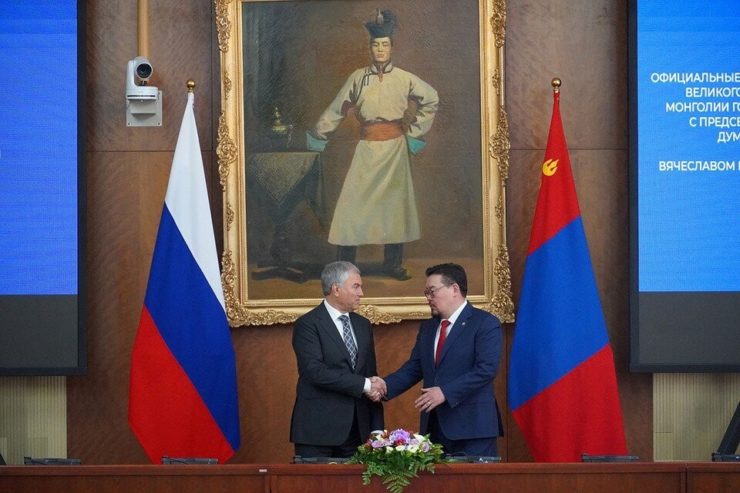
On September 25, 2023, the visit of Vyacheslav Volodin, the Speaker of the State Duma of the Federal Assembly of the Russian Federation to Mongolia, was concluded.
In its content, Mr. Volodin’s visit to Mongolia was similar to the recent visit of the Speaker of the Mongolian Parliament, Gombojav Zandanshatar, to Russia, and marked the logical development and completion of those endeavors that had been outlined by the two Speakers back in Moscow. In addition to meeting with his Mongolian counterpart, the Duma Speaker held talks with the Prime Minister and President of Mongolia. An important ceremonial event during this visit was the laying of flowers by the Russian delegation at the monument dedicated to the famous “Commander of Victory” Marshal Georgy K. Zhukov, whose name in Mongolia is inextricably linked with the victory on Khalkhin-Gol over the Japanese militarists in 1939.
During the visit of the Speaker of the State Duma, the issue of the future of Russian fuel supplies to Mongolia was the particular focus of discussion. Recent news of Russia’s imposition of export restrictions on the industry has worried Ulaanbaatar, 90% of whose fuel imports are supplied by Russian companies. In turn, fuel supplies take up a solid share of all Mongolian imports, reaching nearly $2 billion in 2022, or about 20 percent of all imports. Mr. Volodin assured his Mongolian colleagues that the restrictions imposed would not apply to friendly countries, which include Mongolia. The Mongolian side responded to this assurance with gratitude.
Separately, the Russian side raised the issue of expanding the study of the Russian language in Mongolia. Recognizing its relevance, the Mongolian side shared plans to create Russian-Mongolian schools in different regions of the country. One such Russian-Mongolian bilingual school in Ulaanbaatar has been operating successfully for many years.
A fundamentally new “program item” in the bilateral visits at the highest level was Mr. Volodin’s participation in the work of the first meeting of the Russian-Mongolian Interparliamentary Commission. The parties announced the creation of this “negotiation platform” during the recent visit of Volodin’s Mongolian “vis-a-vis” – the speaker of the Great State Khural, Gombojav Zandanshatar, to Moscow.
The first meeting of the Russian-Mongolian joint interparliamentary commission on cooperation was held in Ulaanbaatar. In his welcoming remarks to the participants of the meeting, the Speaker of the Great State Khural of Mongolia, Mr. Gombojav Zandanshatar, noted the diverse and multifaceted agenda with which the Commission will work: in addition to the issues of inter-parliamentary cooperation, the parties intend to discuss trade, economic and humanitarian issues, and to discuss ideas to expand and deepen cooperation between the two countries. In particular, at the first meeting, the sides exchanged views on fuel and energy, environmental protection, education, agriculture, tourism and transportation and infrastructure issues of bilateral cooperation.
It should be noted that such a format in bilateral relations between Russia and Mongolia is not an innovation. Since the late 1990s, meetings of the Russian-Mongolian Intergovernmental Commission have been held annually, where a wide range of issues – primarily trade, economic, scientific and technical – were also discussed.
Nevertheless, the establishment of a new regular platform for bilateral negotiations seems very justified. Relations between the two countries are actively developing. In particular, as was announced at the Eastern Economic Forum, which took place shortly before Volodin’s trip to Ulaanbaatar, the volume of bilateral trade between Russia and Mongolia will reach three billion dollars. This is a significant figure, given that the previous milestone of $2 billion in bilateral trade was crossed only a year before. Since the issue of expanding Mongolian supplies to Russia is still being discussed by the parties (now within the framework of the inter-parliamentary commission), its solution may cause a new jump in the scale of trade and economic cooperation between the two countries. After all, Russia’s growing interest in expanding ties and contacts with friendly states should not be overlooked.
Thus, Mr. Volodin’s visit to Mongolia was a gesture of reciprocity to the Mongolian side and completed the exchange of Russian and Mongolian high-level visits for 2023. If the challenging year of 2022 in terms of bilateral visits was unremarkable due to difficult global-political conditions, this year the political level of interactions was successfully restored. Moreover, it was marked by the creation of a new negotiating format designed to meet the growing needs of Russian-Mongolian political, economic and humanitarian contacts.
Boris Kushkhov, the Department for Korea and Mongolia at the Institute of Oriental Studies of the Russian Academy of Sciences, exclusively for the online magazine “New Eastern Outlook”.
